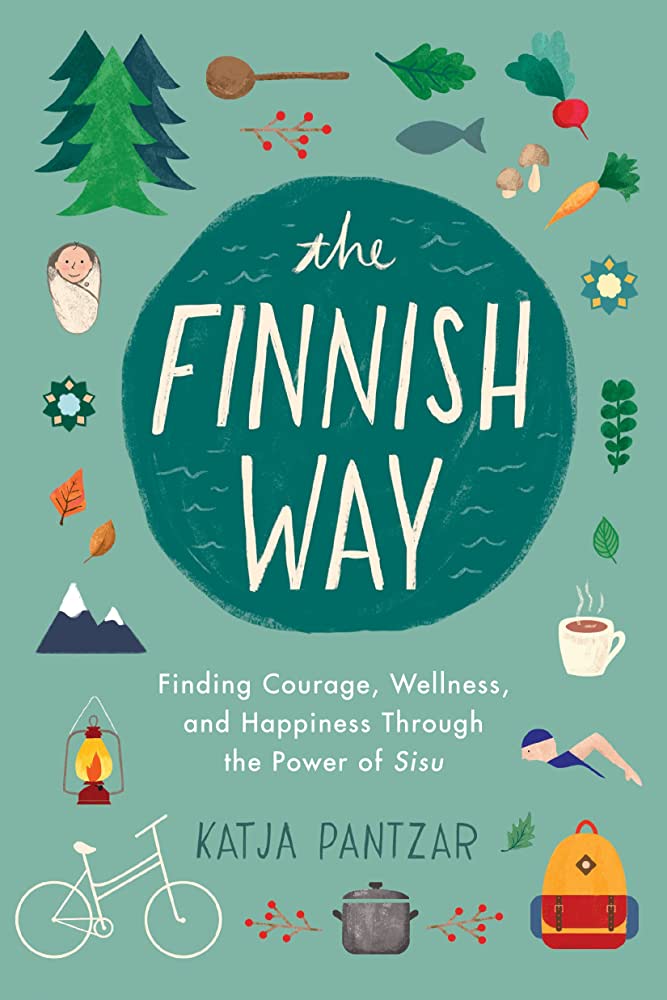This book is about the Finnish lifestyle, in particular about a handful of habits that many Finns employ that may contribute to Finland being consistently ranked one of the world’s happiest countries. The thread running through the book is a concept called sisu, which is a sort of combination of grit, courage, and bias for action. Here’s how the author, Katja Pantzar, attempts to define it at the end of the book:
If you were to ask me what sisu means to me now, I would reply that it’s a courageous mind-set that embraces challenges, small and big. It’s also the ability to act in the face of adversity. It’s an approach to life that is open to trying new things and new experiences and going beyond what we think might be our limits.
The book begins with the author’s first time seeing a group of young men in Helsinki wearing bathrobes and joyfully running toward a dock, where they will swim in the sea. A few years later she actually tries it, and so begins her journey of developing her own sisu, which she credits with improving her well-being in a variety of ways.
But before getting into the ways sisu helped her, Pantzar, born in Finland but raised in Canada, talks about the issues she faced in her twenties working in Toronto. Her lifestyle was mostly sedentary, and “relaxing after work” meant going out for drinks multiple times per week. She frequently used sleeping pills, which left her groggy in the morning. She suffered from body image issues, feeling she “could never be skinny enough, beautiful enough, or rich enough.” Eventually she was diagnosed with depression and anxiety, and tried to manage both with medication and psychotherapy, with limited success. But she reflects that she had to discover on her own later how important it was for her mental health to spend time outdoors, to exercise, and to pay attention to her diet. The doctors, she says, never mentioned any of that.
With cold swimming as her entree into the Finnish lifestyle, Pantzar goes on to discover other traditions that Finns employ to maintain their well-being, dedicating a chapter to each. These are: sauna, being in nature, the Nordic diet, attention to early childhood development, cycling instead of driving, movement as medicine, and Nordic minimalism. All of these, she suggests, contain an element of sisu. Each chapter features stories from her own life, as well as quotes from Finnish experts and scientists, with occasional data points to support their claims.
For me, the primary effect of this book was to reiterate that, in many ways, the body controls that mind, not the other way around. Descend into cold water, and your brain will get dosed with endorphins. For those of us who suffer from mental health issues, it’s good to remember that, in addition to the tried and true options of therapy and medication, we do have some agency. We can take small steps to develop habits that will carry us through those times when our mental health rebels against us. It doesn’t have to be cold water swimming. It could be sitting silently in a forest, or dancing to a favorite song, or cooking a favorite meal. Our five senses trigger our bodies’ hormone responses, which affect our mood. It’s science. Naturally, the hard part is to develop those habits before you need them, which is why places like Finland have an advantage: you start learning those habits from birth, because they are cultural.
I like reading these types of books, not because I think it is realistic or advisable to try to adopt all the habits of another culture, but because every culture around the world has traditions that we can learn from. Distinct cultures are the product of generations of trial and error, and the traditions that get passed down are the ones that make people happier, healthier, and more fulfilled. Together they make up the collected wisdom of that way of life. While some of that wisdom will naturally be place-specific, some of it will be nearly universal.
Due to a variety of factors, American culture is no culture at all. Growing up with that inheritance, it makes sense to me to learn from the wisdom of other cultures, including the Finns who seem to have a lot figured out.
